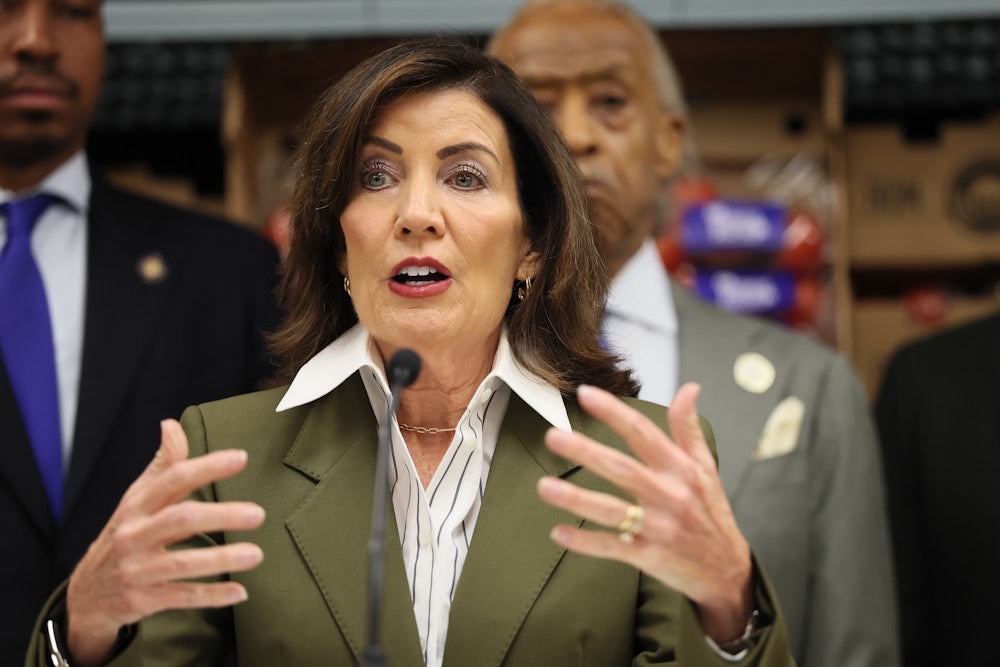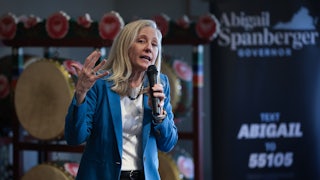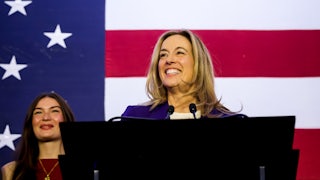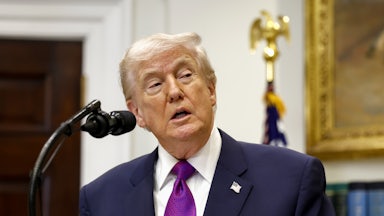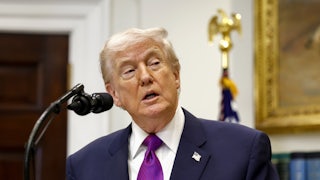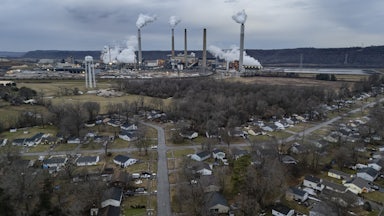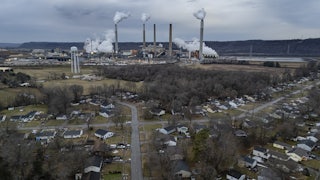Last week The New York Times exposed links between New York Governor Kathy Hochul and the industries benefiting from two of her recent permit approvals: Both the pipeline company whose construction was approved and the private equity firm with a stake in a recently approved cryptocurrency mine are clients of the law firm where Hochul’s husband is a partner.
The news that Hochul might have fossil fuel industry ties made sense; in general, the governor has been friendly to that industry, dragging her feet on expanding publicly funded renewable energy and welcoming pipelines to New York’s waterways and data centers to our crowded grid. While Governor Hochul talks left on climate, once warning that we must not “sacrifice Mother Nature on the altar of profit,” she has backed away from implementing serious climate policy and aggressively pursued energy-intensive AI and supercomputers. But the problem is much bigger than her husband’s conflicts of interests, according to a report released this week.
Lil Sis, a group that tracks corporate influence in politics, reports that polluting industries have spent $15.9 million on lobbying in New York state since 2021, increasing their spending during that time by 52 percent. They have lobbied against a “cap and invest “measure, as well as other initiatives to comply with the state’s 2019 Climate Leadership and Community Protection Act, or CLCPA, which sets timelines for the state to reduce carbon emissions. Lobbyists for polluters have also been donating to Hochul’s reelection fund, with the major firms of this kind—Bolton-St Johns, Hinman Straub, Ostroff Associates, and Greenberg Traurig—all holding fundraisers for her even during her first few months in office. And Hochul’s husband isn’t her only personal relationship to the fossil fuel industry; its lobbying firms have hired numerous people who have worked in Hochul’s administration or have other close ties to Democrats in state government. To take just one example from the report, Bolton-St Johns employs Michael Keogh, the husband of Hochul’s chief of staff, Karen Keogh; Jordan Beberman, Hochul’s former director of New York City intergovernmental affairs; and Sage Cihak, who was an intern in her office. The firm regularly lobbies the governor on behalf of fossil fuel clients like National Fuel, one of the biggest industry leaders in the effort to unravel New York’s climate policy, according to the Lil Sis report.
This isn’t just an issue with Hochul, though. Many Democrats—even those being eyed most for the presidency in 2028—are way too close to polluters.
Last week, Pennsylvania Governor Josh Shapiro, in a shocking betrayal of current and future Pennsylvanians, left the Regional Greenhouse Gas Initiative, a compact between 10 states agreeing to cap the amount of permissible emissions from power plants. Advocacy group Pennsylvania Action on Climate notes that he accepted a luxury box at an Eagles game from a lobbyist who represents fossil fuel companies. Another example of subtle fossil fuel ties is that the Democratic Governors Association is his biggest campaign donor by far, and that group receives millions from the fossil fuel industry, allowing governors like Shapiro to accept dirty polluter money without appearing to do so.
Illinois Governor JB Pritzker’s investments over the years have included some of the best-known targets of the climate movement, including a company with a part-ownership in the Dakota Pipeline. The Pritzker family’s venture capital firm is heavily invested in tech start-ups. The Illinois governor is rushing to bring more AI and data centers to his state, despite the massive energy suck such projects represent.
Then there’s Gavin Newsom, who has been treated as a rock star at COP30, the United Nations climate change conference, for his stellar climate messaging. But as journalist Miranda Green points out, “his climate receipts are messy,” as he has been going soft on fossil fuels recently—boosting oil drilling, being indulgent with industry on oil refineries and data centers, allowing emissions to rise, and signaling a reversal on a plan to phase out gas-powered cars. PG&E, a utility that lobbies extensively on energy policy, has been a major donor to Newsom’s campaigns, as well as to his wife’s film projects. In June 2020, PG&E pleaded guilty to 84 counts of involuntary manslaughter in wildfires that ravaged a northern California town called Paradise.
Climate activists protested Newsom’s backtracking on climate in September, at Climate Week in New York City in September. Drawing this kind of attention to Democratic doublespeak is important. But perhaps these abuses should be addressed, as well, via the only other form of left criticism that Democratic leadership seems to understand: primary challenges.
Hochul, who is working with incoming socialist Mayor Mamdani on popular issues like childcare, now faces a primary from her left, partly because of her slow pace on climate issues. Her challenger is her current lieutenant governor, Antonio Delgado, who has marched in climate protests demanding more progress from her administration. And for those with 2028 ambitions, like Pritzker, Newsom, and Shapiro, perhaps only a left primary contender could help focus attention on the matter. Green New Deal co-author Alexandria Ocasio-Cortez hasn’t made her plans clear—she’s reportedly considering either a run for the Senate or the presidency—but it seems advisable to keep the idea in the air, as well as to follow these fossil fuel lackeys wherever they go. It’s one more sign that while we obviously have to get rid of Trump, the opposition party needs to change too—or move aside.
